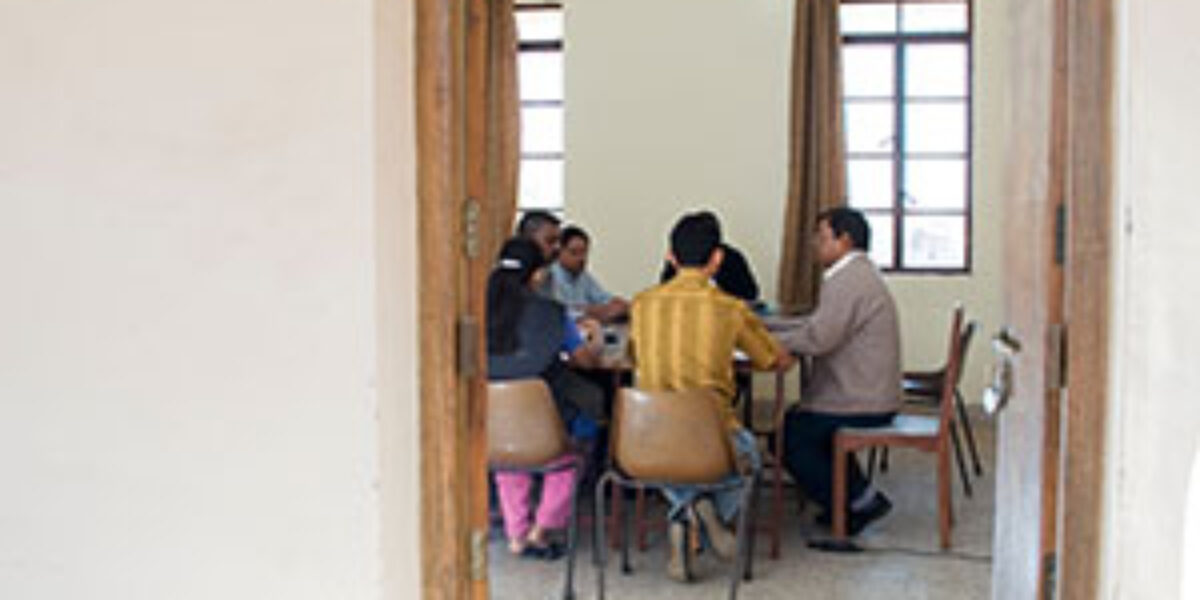PUNE, India (Mennonite Mission Network) — For more than half a century, Union Biblical Seminary has trained Christian leaders who want to merge faith, scholarship and action. Beginning in June, UBS will accept its first doctoral students, after the Senate of Serampore College approved the UBS application to provide a doctorate in Old Testament in March.
Three doctoral students are allowed to be enrolled at UBS from June 2008. The admission procedure is underway.
Samson Parekh, seminary principal, said the programs fill a need for Mennonites and other evangelical Christians in India.
“We have been sending people abroad [to study] because we didn’t have doctoral programs in India where you could do research in an evangelical setting,” Parekh said. Many of the students trained abroad, he continued, never return to India.
Mennonites were instrumental in the early years of UBS, which now partners with Mennonite Mission Network and more than 20 other denominations. Mennonite Mission Network and Mennonite Church Canada Witness still support the seminary, most recently sending Canadian professor Ben Wiebe to teach during the winter 2008 semester.
“One of the footprints the missionaries have left is UBS,” said Sushant Rajat Nand, a Mennonite student from Korba, India, and the Bharatiyah General Conference Mennonite Church. “We count this as one of their greatest achievements. We are proud that our Mennonite missionaries have given this instrument to India.”
The seminary hopes to receive government registration for a second doctorate program in missions. Parekh hopes to one day also offer doctorate degrees in New Testament and Christian ministry.
Doctorate degrees, UBS leaders said, become more important as the makeup of India Christians evolves. While many early converts came from the lower castes, higher castes and people with more education now are finding Christianity attractive.
“Many non-Christians are coming to the Lord,” Parekh said. “What happens if the person who takes care of them is not trained theologically?”
UBS already offered master’s degrees in Old Testament, New Testament, Christian Ministry and Missions, four-year bachelor’s degrees, and distance education programs. All of the programs try to balance theology with practical outreach experience.
“The church exists for the people outside the church. Unless the church becomes a missionary church, it is a stationary church,” Parekh said. “Slowly it will become weak and go out of existence.”
Each student receives hands-on missionary training, serving in a mission field for seven months as part of their studies. Parekh said he wants students to experience how their theology works on the streets.
“The teaching we had, they want us to go out and apply that,” said P. Chikumla Yimchunger, a student from Nagaland who served in Delhi. “Knowledge by itself does not do much without practical experience.”
“We don’t want their theology to come out of nice offices,” Parekh said. “We want it to come from our interaction with non-Christians on the streets.”
The seminary’s emphasis on servant-leadership is evident in the campus centerpiece – Esther Augsburger’s statue of one disciple washing the feet of another disciple – and the campus presence in its neighborhood. UBS runs a primary school, a day care center and programs in sewing, fashion design and cooking to help community members train for better jobs.
Leaders said the seminary has a responsibility to help community members better themselves, just as it has a responsibility to help students called to the ministry receive instruction.
Parekh said only about 10 percent of UBS students can afford to pay all school costs and fees, so the seminary charges only about half of the cost of educating each student. He works to raise matching scholarships for more than 150 students as well as seeking donations for the costs not covered by tuition.
“We are very thoroughly evangelical, not only among ourselves, but we are also known as evangelical outside of UBS,” Parekh said. “Mennonites did a great job here. Their piety, their holiness, their way of life contributed a lot. Mennonites have a perspective of holiness, of light. They not only demonstrate that but they teach it.”
Parekh said UBS is committed to serving the church in India to its fullest.
“The church is the entity from which we work,” said Parekh. “Even if they don’t support us financially, we need their prayer support. I strongly believe in prayer.”







